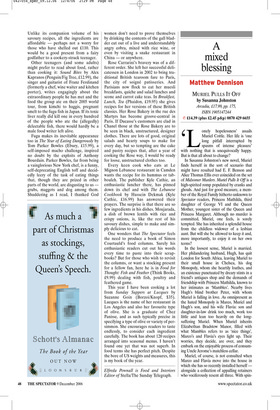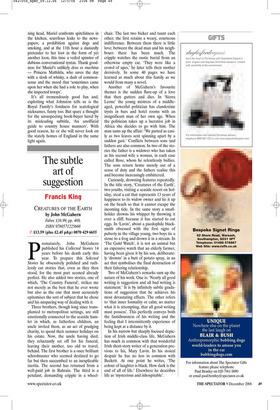A mixed blessing
Matthew Dennison
MURIEL PULLS IT OFF by Susanna Johnston Arcadia, £17.99, pp. 175, ISBN 1905147244 ✆ £14.39 (plus £2.45 p&p) 0870 429 6655 ‘L onely hopelessness’ assails Muriel Cottle. Her life is ‘one long pitfall interrupted by spasms of intense pleasure’ with nothing that is unequivocally happy. But is that all about to change?
In Susanna Johnston’s new novel, Muriel finds herself in the sort of scenario that might have resulted had E. F. Benson and Alice Thomas Ellis ever coincided on the set of Midsomer Murders. Muriel Pulls It Off is a high-spirited romp populated by cranks and ghouls. And just for good measure, a member of the Royal Family hitherto unknown to Spectator readers, Princess Mathilda, third daughter of George VI and the Queen Mother, youngest sister of the Queen and Princess Margaret. Although no murder is committed, Muriel, one feels, is sorely tempted. She has inherited a splendid house from the childless widower of a lesbian aunt. But will she be allowed to keep it and, more importantly, to enjoy it on her own terms?
In the loosest sense, Muriel is married. Her philandering husband, Hugh, has quit London for South Africa, leaving Muriel to their small house in Chelsea, his dog Monopoly, whom she heartily loathes, and an existence punctuated by dreary stints in a friend’s antiques shop and the demands of friendship with Princess Mathilda, known to her intimates as ‘Mambles’. Nearby lives Hugh’s blind brother Peter, with whom Muriel is falling in love. As omnipresent as the hated Monopoly is Marco, Muriel and Hugh’s son, and his wife Flavia: son and daughter-in-law drink too much, work too little and lean too heavily on the longsuffering Muriel. When Muriel inherits Elizabethan Bradstow Manor, filled with what Mambles refers to as ‘nice things’, Marco’s and Flavia’s eyes light up. Their worries, they decide, are over, and they embark on the enjoyable process of consuming Uncle Jerome’s matchless cellar.
Muriel, of course, is not consulted when Marco and Flavia move into the house in which she has so recently installed herself alongside a collection of appalling retainers who vociferously resent all three. With spin ning head, Muriel confronts spitefulness in the kitchen, scurrilous leaks to the newspapers, a prohibition against dogs and smoking, and at the 11th hour a dastardly pretender to her loot in the form of yet another loon, this time a veiled spinster of dubious conversational syntax. Thank goodness for Muriel’s unlikely deus ex machina — Princess Mathilda, who saves the day with a slosh of whisky, a dash of commonsense and the mood that ‘sometimes came upon her when she had a role to play, when she inspected troops’.
It’s all tremendously good fun and, exploiting what Johnston tells us is the Royal Family’s fondness for scatological nicknames, funny too. But spare a thought for the unsuspecting book-buyer lured by its misleading subtitle, ‘An unofficial guide to country house manners’. With good reason, he or she will never look on the stately homes of England in the same light again.



























































































 Previous page
Previous page